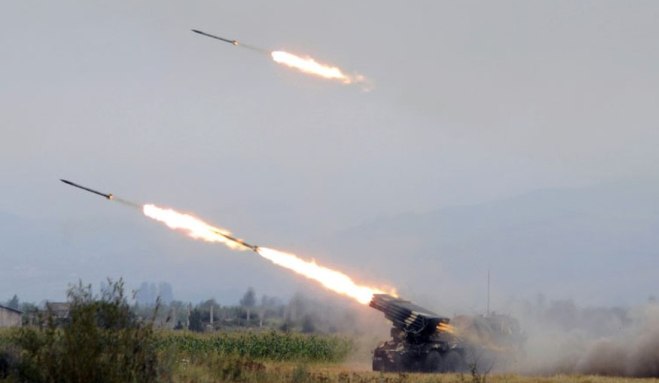Ossetia war, what a change in three years, by Patrick Armstrong

Georgian army rocket batteries firing on Ossetian cities and villages
Patrick Armstrong | Special to Abkhaz World
Three years ago “we were all Georgians now”; Western media outlets transmitted Tbilisi’s propaganda without question; anti-Russian leaders gathered in Tbilisi, linking arms to stop by moral force the flood of Russian armour; pipelines were threatened by the Russian onslaught; the US Embassy passed to Washington whatever Tbilisi told it; democracy was threatened. A fine example of the lingering hyperbole is this piece in 2009, claiming Moscow was planning a new attack on Georgia and “Unless European states and America suddenly adopt a hawkish foreign policy and strengthen their militaries, Europe will become a mere province of the Russian empire.” Why Moscow didn’t complete the conquest in 2008 the author doesn’t explain.
Three years later it is quite different. Der Spiegel’s (one of the few Western media outlets that exercised a measure of scepticism) quotation that Saakashvili lied to us all has deeper resonance after the exposure of his changing stories about the origin of the war, the “war of the worlds” broadcast, faked shooting events and military coup reports. Georgia’s opposition – divided and incoherent though it is – persists. Saakashvili is re-constructing Georgia’s Constitution so as to stay in power. NATO membership is off offer. Georgia’s economy is fading and it has lost most of the foreign aid that propped it up for so long. Even the late and feeble EU report on the war could not support Saakashvili’s assertion that the Russians fired first. South Ossetia and Abkhazia are lost to Georgia probably forever. Saakashvili tries to keep the “Russian threat” alive but, as evidenced by his latest spy arrests, he is losing credibility at home and abroad.
Russia, on the other hand, has quite a different status today. Still, to a degree, on the “outside”, it is being courted by many European powers. NATO has decided it needs Russian supply routes. It survived the financial crisis well and, as I have argued elsewhere, there is the beginning of a “third turn” in the West’s opinion of Russia. I believe that the war began the evolution by eroding Saakashvili’s reputation as reliable, truthful and democratic. And, in the process, caused people to re-examine their assumptions about Moscow’s behaviour and intentions. Although many people might be loathe to admit it, it did exactly what it said it would do in the South Ossetia war; it did not seize pipelines, invade and conquer Georgia or any of the other things that excited observers expected.
In short, Saakashvili’s attempt to capture South Ossetia (and later Abkhazia) by a coup de main relying on support from the West backfired. He, and his unhappy country, are worse off three years later and Russia is better off.
Patrick Armstrong received a PhD from Kings College, University of London, England in 1976 and started working for the Canadian government as a defence scientist in 1977. He began a 22-year specialisation on the USSR and then Russia in 1984, and was Political Counsellor in the Canadian Embassy in Moscow from 1993 to 1996.
